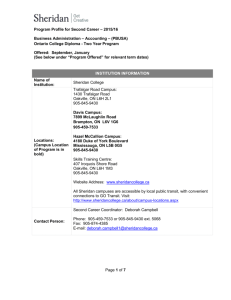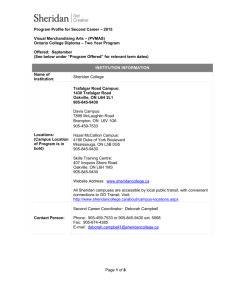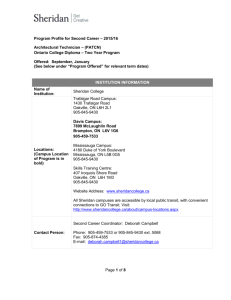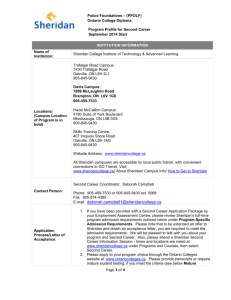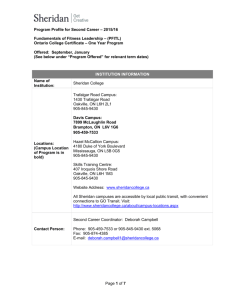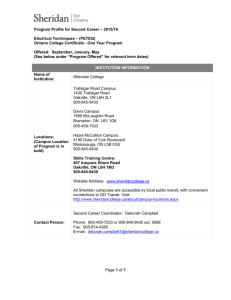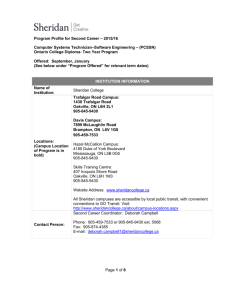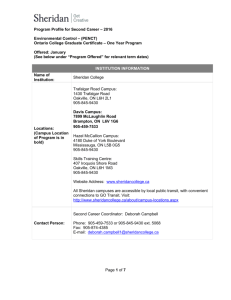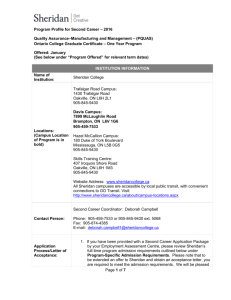INSTITUTION INFORMATION
advertisement
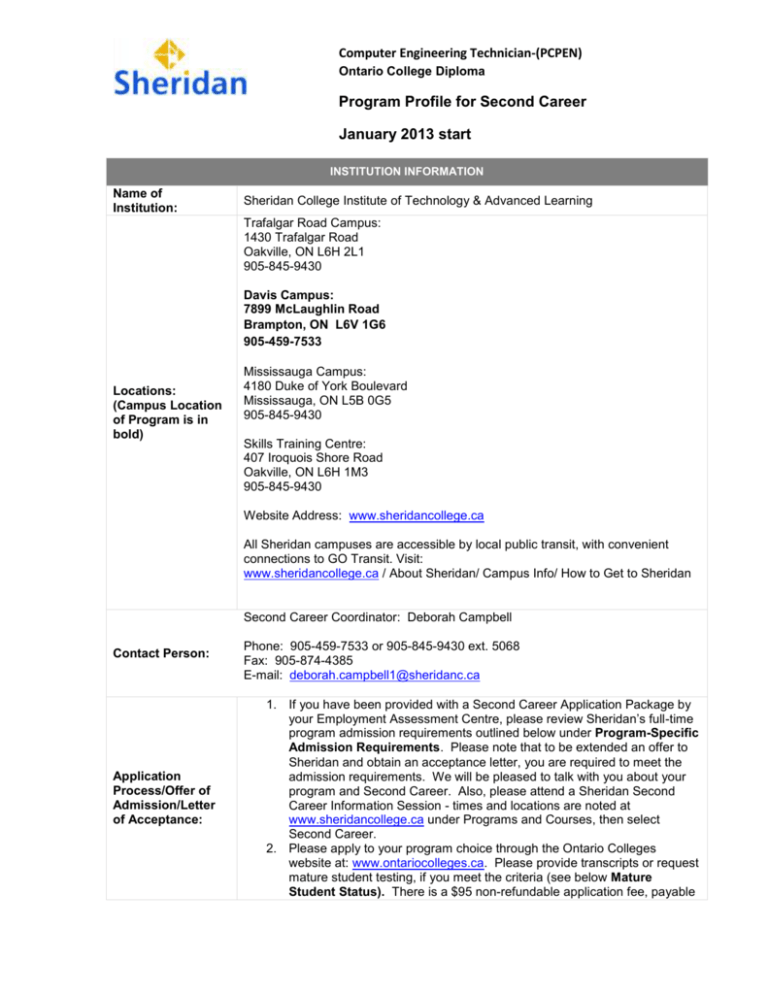
Computer Engineering Technician-(PCPEN) Ontario College Diploma Program Profile for Second Career January 2013 start INSTITUTION INFORMATION Name of Institution: Sheridan College Institute of Technology & Advanced Learning Trafalgar Road Campus: 1430 Trafalgar Road Oakville, ON L6H 2L1 905-845-9430 Davis Campus: 7899 McLaughlin Road Brampton, ON L6V 1G6 905-459-7533 Locations: (Campus Location of Program is in bold) Mississauga Campus: 4180 Duke of York Boulevard Mississauga, ON L5B 0G5 905-845-9430 Skills Training Centre: 407 Iroquois Shore Road Oakville, ON L6H 1M3 905-845-9430 Website Address: www.sheridancollege.ca All Sheridan campuses are accessible by local public transit, with convenient connections to GO Transit. Visit: www.sheridancollege.ca / About Sheridan/ Campus Info/ How to Get to Sheridan Second Career Coordinator: Deborah Campbell Contact Person: Application Process/Offer of Admission/Letter of Acceptance: Phone: 905-459-7533 or 905-845-9430 ext. 5068 Fax: 905-874-4385 E-mail: deborah.campbell1@sheridanc.ca 1. If you have been provided with a Second Career Application Package by your Employment Assessment Centre, please review Sheridan’s full-time program admission requirements outlined below under Program-Specific Admission Requirements. Please note that to be extended an offer to Sheridan and obtain an acceptance letter, you are required to meet the admission requirements. We will be pleased to talk with you about your program and Second Career. Also, please attend a Sheridan Second Career Information Session - times and locations are noted at www.sheridancollege.ca under Programs and Courses, then select Second Career. 2. Please apply to your program choice through the Ontario Colleges website at: www.ontariocolleges.ca. Please provide transcripts or request mature student testing, if you meet the criteria (see below Mature Student Status). There is a $95 non-refundable application fee, payable Computer Engineering Technician-(PCPEN) Ontario College Diploma Program Profile for Second Career January 2013 start to Ontario Colleges. 3. If Sheridan determines you do not meet the admission requirements through transcripts or testing, we will provide you with information about how you can most efficiently obtain the necessary prerequisites through Sheridan’s Upgrading or ESL Programs. 4. If you are accepted into your program choice, you will receive an offer of admission and, subsequently, a detailed acceptance letter, which you will submit with your Second Career funding application. Certification of School: Sheridan is an Ontario Public College and is certified to issue T2202A tax receipts. Sheridan recognizes that some students who enter a program at the College will have earned postsecondary credits at other recognized postsecondary institutions and may wish to apply these credits towards the Sheridan credential. Advanced standing refers to the transferring of credit earned at another recognized postsecondary institution towards a Sheridan credential. Students may apply to receive advanced standing for specific Sheridan course(s) based on the successful completion of similar courses at other recognized postsecondary institutions subject to meeting applicable Sheridan policies. Advanced Standing: Candidates must have achieved a minimum course grade of 65% or the minimum pass for promotion within the program, whichever is higher, for a request for advanced standing to be considered. Courses considered for advanced standing must have been completed within five years prior to the request. Please refer to the full Advanced Standing policy on Sheridan’s Policies and Procedures website for specific details. Mac users please note: you must use Firefox, Opera or Netscape to access the documents on the Policies and Procedures website. PROGRAM INFORMATION Program Name/Credential: Computer Engineering Technician Ontario College Diploma (PCPEN) Ontario Secondary School Diploma or equivalent, including these required courses: Program-Specific Admission Requirements: One English, Grade 12 (ENG4C or ENG4U) Plus Grade 12 Mathematics for College Technology (MCT4C) or Grade 11 Functions (MCF3M) or Grade 11 Functions and Relations (MCR3U) or any Grade 12 (U) Mathematics Computer Engineering Technician-(PCPEN) Ontario College Diploma Program Profile for Second Career January 2013 start Or, Mature Student Status – Mature students do not possess an Ontario Secondary School Diploma, or equivalent, and are 19 years of age or older before the starting date of the program. Mature students who apply to Sheridan’s certificate and diploma programs must demonstrate their ability to work at the postsecondary level in one of the following two ways: By successfully completing equivalency testing in English and/or mathematics and/or; science or By completing a program of academic upgrading at a level appropriate to the program of choice.* Mature students must demonstrate proficiency in meeting specific program prerequisites. *If you do not have the required prerequisites, you may wish to enrol in Sheridan’s Academic Upgrading program to obtain equivalent credits. Sheridan also offers an ESL program. Preparatory training, such as academic upgrading, is eligible for Second Career funding, subject to the approval of Employment Ontario. Applicants who do not meet the admission requirements may be invited to complete pre-admission tests in mathematics and English. Applicants asked to take the tests are considered for admission to Term 1 contingent on receiving a minimum grade of 60% in both the pre-admissions mathematics/English tests. Applicants who are lacking the mathematics admission requirements for this program may be able to be admitted into this program with additional courses completed in their first year at Sheridan. There may be additional costs involved depending on the program. Applicant Selection Eligible applicants will be selected on the basis of their previous academic achievement (the average of their six highest senior-level credits, including required courses), and/or results of pre-admission testing. Applicants who do not meet the admission requirements for this program will be assessed and advised individually and may be considered for other, related programs. Admission at an Advanced Level (Direct Entry) Students may apply for admission at an Advanced Level (Direct Entry) to Year 2 of this program if they have relevant credits from a university or college. Students may have to complete certain courses from Year 1 prior to graduation. Computer Engineering Technician-(PCPEN) Ontario College Diploma Program Profile for Second Career January 2013 start Start/End dates by semester: Jan. 2013 start Jan. 7, 2013 1 To April 19, 2013 May 6, 2013 2 To Aug. 16, 2013 Sept. 3, 2013 3 To Dec. 13, 2013 May 4, 2014 4 To Aug. 15, 2014 Please note – this program has a four month break between semesters 3 and 4 (January to May 2014). Program Length/ Hours/Weeks: This is a full time 2 year program (PCPEN): (4 semesters of 14 weeks each) Hours per week: approx. 20 (daytime hours between 8:00 a.m. and 6:00 p.m., Monday to Friday) The Christmas break is approximately 3 weeks, and breaks between semesters are two weeks. Students will be notified about their class schedule and timetable prior to the beginning of each semester. Class Size: Approx. 35 Course Outline: See Program Outline section below Registration Fee – (applicable at time of publication – subject to change without notice): The $95 non-refundable application processing fee paid to Ontario Colleges covers application processing for one application cycle. Annual Tuition 2013/14 – (applicable at time of publication – subject to change without notice): • Year 1: $4,196.20 • Year 2: * *Tuition fees are regulated by the Ministry of Training, Colleges and Universities. By action of the Ontario government, a change may be made to year two tuition. For purposes of your research, please use the year one tuition. Parking 2013/14 – (applicable at time of publication – subject to change without notice): Additional Costs – (applicable at time of publication – subject to change without notice): • One Month: $80.00 • One Semester (September to January): $186.00 • Two Semesters (September to May): $343.00 • Three Semesters (September to August): $410.00 Year 1 Books: $525.00 Expendable Supplies: $412.00 Year 2 (subject to increase) Books: $525.00 Expendable Supplies: $412.00 Computer Engineering Technician-(PCPEN) Ontario College Diploma Program Profile for Second Career January 2013 start Mobile Program - laptop required: Mobile computing programs require the use of a laptop as a mandatory component of curriculum during academic terms. New students in mobile computing programs must bring a laptop of their choice that will meet the program’s requirements. For more information please refer to: mobilecomputing.sheridaninstitute.ca. Other: Payment Policy for Second Career: Refund Policy: Option 1: Payment of total fees for one full year should be paid in full by the tuition deadline. Please refer to your Fees Invoice for tuition deadlines as deadlines vary depending on when you are extended and accept an offer. If you withdraw by the tenth scheduled day of the first term, then all fees are refunded. If you withdraw by the tenth scheduled day of the second term, then all second term fees are refunded, etc. In any case, a $100 administrative processing charge is withheld. Innovation is the rule in computer Engineering Technology, and it’s the hallmark of the computer engineering diploma program at Sheridan. We provide hands-on experience and a problem-solving approach to computer engineering technology, teaching students to find creative, outside-the-box solutions to real-world computer engineering problems. You’ll develop high-level programming and computer engineering skills that translate directly to the workplace and are in high demand among employers. During third year, you can apply for one of three paid co-op work terms, gaining professional experience to augment your studies. Fundamental Principles to Advanced Concepts Your Second Career in Computer Engineering Technician: Sheridan’s Computer Engineering program places more emphasis on fundamental math and engineering principles than most computer engineering colleges. Second- and third-year courses focus on advanced computer engineering concepts, ranging from software development to embedded systems design. You’ll learn to: Design, implement, and maintain the architecture for computer systems and networks Create process control, data acquisition, and data management solutions Integrate networking technologies with information systems Work with microcontrollers, wireless systems, and other consumerproduct technologies Design and manage information servers Computer Engineering Technician-(PCPEN) Ontario College Diploma Program Profile for Second Career January 2013 start Professional Affiliations and More Because these programs are nationally accredited by the Canadian Technology Accreditation Board, graduates may seek professional certification with the Ontario Association of Certified Engineering Technicians and Technologists (OACETT). Sheridan’s Computer Engineering program employs mobile computing, so you’ll have 24/7 access to lecture notes and other subject material, on campus and off. After graduation, students can apply for entry to Sheridan’s Bachelor of Applied Information Sciences (BAISc) (Information Systems Security) Program. Computer Engineering Technology Technician courses are held at the Davis Campus in Brampton, Ontario. Computer engineering technology skills are extremely marketable across many industries. Sheridan graduates are particularly well qualified for jobs that involve programmable controllers, data acquisition systems, embedded controllers and electronic instrumentation. However, they will find employment opportunities wherever a technologist is required with multiple skills in programming and hardware integration. Graduates may obtain employment as: Career opportunities/ Employment Prospects/Success Factors: Embedded Systems Designers Network Analysts and/or Network Installers Systems Analysts Network Designers Software Specialists Product Development Specialists Programmers With experience, graduates may move into management and supervisory positions. Alumni of Sheridan can access all in-person and web-site Career Centre’s services for assistance in Career Counselling and Employment Advising for one year after their graduation date. After one year, they can access all web-site services including jobs.sheridan (our on-line job posting system). Method of Instruction: Equipment Availability: Instructor Qualifications: Courses are instructor-led. Students will engage in a variety of applied learning and experiential activities and will complete multiple industry projects. Students will have access to computers in open access computer labs. College faculty are hired based on a combination of industry experience and academic qualifications. Most full-time faculty have relevant Master’s degrees and/or professional certifications where applicable to their field of expertise. Computer Engineering Technician-(PCPEN) Ontario College Diploma Program Profile for Second Career January 2013 start Faculty are provided with opportunities to engage in professional development to ensure currency in their field as well as proficiency in teaching adults. All Sheridan’s programs are designed and kept up to date with input from Program Advisory Committees that include representation from employers and industry organizations. Curriculum Design: Network for Innovation & Leadership in Education at Sheridan (NILES) at Sheridan oversees the design of new programs and courses and maintains a schedule of program review to keep programs up to date. Students have the opportunity to complete a formal evaluation of the course and instructor at the end of each course. Evaluation of Instructors, Courses and Programs: Physical Facilities: In addition, students can participate in the Student Satisfaction Survey to evaluate their program. Public colleges must survey students, graduates and employers as mandated by the Ministry of Training, Colleges and Universities to obtain information on Key Performance Indicators (KPIs). Please visit: Sheridan Home Page, About Sheridan, Sheridan at a Glance, Key Performance Indicators (KPIs). Sheridan classrooms and campus facilities are accessible and are designed to support a wide range of applied learning activities. Classrooms and labs are equipped with modern technology, including digital AV teaching and learning aids. At the Davis and Trafalgar Road campuses, gyms and fitness centres, full-service cafeterias, modern learning resource centres and vibrant student centres contribute to supporting student learning and life. Both campuses have attractive grounds that provide a relaxing counterpoint to the hustle and bustle of student activity. As a public college, Sheridan is able to offer a full range of student services and supports: Athletics and Recreation Additional Supports and Resources Available: Career Centre (job search assistance): available for one year following graduation Counselling and Special Needs Services Disability Services Library Services Peer Tutoring and Mentoring Computer Engineering Technician-(PCPEN) Ontario College Diploma Program Profile for Second Career January 2013 start Health Services Student Advisement Centre Student Union Special Accommodations: Sheridan’s Accessible Learning Services office facilitates equal access for eligible students with disabilities by coordinating reasonable academic accommodations and support services. Accommodation plans and services are tailored to correspond with the disability related needs of each student and are determined based on the documentation provided and program specific requirements. Computer Engineering Technician-(PCPEN) Ontario College Diploma Program Profile for Second Career January 2013 start PROGRAM OUTLINE Course Requirements: Course code: Course Name: Hours / week: Semester 1: ENGI 19473 Applied Electricity 4 ENGI 16434 Electronic Fabrication 4 PROG 10082 Object Oriented Programming 1 – Java 6 INFO 16029 Problem Solving/Programming Logic 3 MATH 17688 Mathematics 1 3 TOTAL HOURS PER WEEK 20 ENGI 10701 Digital Principles 4 ENGI 27907 Electronics Devices and Circuits 4 PROG 24178 Object Oriented Programming 2 – Java 6 SYST 13416 Linux/Unix Operating Systems 3 MATH 24376 Applied Calculus 3 SCIE 16048 Technology: Apocalypse or Eden 3 TOTAL HOURS PER WEEK 23 DBAS 27198 Database Design and Implementation 4 ENGI 25327 Electronic Circuits 4 PROG 28263 Internet Site Development – Java 6 SYST 26671 Computer Architecture 3 ENGI 14322 Electronic Drafting and CAD 2 Semester 2: Semester 3: Computer Engineering Technician-(PCPEN) Ontario College Diploma Program Profile for Second Career January 2013 start ELECTIVE Cross College General Education 3 COWT 10022 Cooperative Education Forum 1 TOTAL HOURS PER WEEK 22 DBAS 32100 RDBMS Application Development 3 ENGI 22245 Microprocessors 4 PROG 20707 C Programming 4 INFO 20172 IT Project Management Using PMP 3 SYST 20261 Applied Operating Systems Design 3 ELECTIVE Cross College General Education 3 TELE 13167 Communications - Local Area Networks 1 TOTAL HOURS PER WEEK 23 Semester 4: **Note: Courses Subject to Change Computer Engineering Technician-(PCPEN) Ontario College Diploma Program Profile for Second Career January 2013 start COURSE DESCRIPTIONS COURSE Applied Electricity Code: ENGI 19473 Hours / wk: 4 This course is designed to provide a working knowledge of electricity for Electromechanical Engineering Technicians and Technologists. Emphasis will be placed on fundamentals with laboratories designed to develop wiring skills, knowledge of basic electrical safety, and an understanding of the nature of electricity. Complementary laboratory work will include the use of analog and digital meters, and DC power supplies. Initially, fundamental topics in basic electricity, magnetism, electrical measurement and DC electric circuits will be studied. Students will then investigate applications such as electrical energy conversion, digital/analog electronic instrumentation, classical circuit theorems to calculate currents and voltages in resistive networks, and power and efficiency in small systems. Basic inductive and capacitive components will be studied. Periodic waveforms and AC voltage, current, power, and ac transformers will be studied briefly. COURSE Electronic Fabrication Code: ENGI 16434 Hours / wk: 4 In this course, the students will build leads, a regulated power supply, a logic board, and a printed circuit board. The leads, power supply, and logic board will be used throughout the remainder of the technician and technology programs. Students will learn about laboratory safety procedures, tools, component codes, replacement guides, electronic symbols, troubleshooting, and construction techniques. The reading of schematic diagrams will be introduced. Students will be required to buy hand tools, the parts for the projects, and a parts kit to be used for experiments throughout the rest of the program. COURSE Object Oriented Programming 1 - Java Code: PROG 10082 Hours / wk: 6 This course introduces students to the basic concepts of an object-oriented programming language. Assuming no programming experience, this course will introduce the student to language syntax, object-oriented concepts as well as design considerations when generating a programming solution to a given problem. The student will learn how to use the procedural programming control statements, built-in data types of the language plus learn predefined Computer Engineering Technician-(PCPEN) Ontario College Diploma Program Profile for Second Career January 2013 start classes. Emphasis will be placed on the syntax of the language relating to the management of objects to solve programming problems, especially as these relate to encapsulation and inheritance. COURSE Problem Solving/Programming Logic Code: INFO 16029 Hours / wk: 3 This introductory course is designed to help students to learn the logical aspects of computer programming. Four themes supplement the central thrust of the course: a) Boolean logic and conditional expressions, b) Control structures and algorithmic problem-solving, c) Problemsolving frameworks for computer programming, d) Basic object-oriented concepts and their relationship to procedure development. COURSE Mathematics 1 Code: MATH 17688 Hours / wk: 3 Students cover fundamental concepts and operations of trigonometric functions of any angle, vectors, linear functions, graphing of functions, systems of linear equations, factoring and fractions, and quadratic equations which are necessary for a student in Engineering Sciences. Emphasis is placed on applying these mathematical concepts and skills to solve technical and physical word problems. Students are expected to use direct entry scientific calculators accurately. Graphing and solver software are used to aid students in their application of mathematical skills to solve word problems. COURSE Digital Principles Code: ENGI 10701 Hours / wk: 4 COURSE Electronics Devices and Circuits Code: ENGI 27907 Hours / wk: 4 This is the first in a series of courses covering electronics theory, applications, circuit design and troubleshooting for the Electronics and Electromechanical Technology and Technician Program students. The course provides an introduction to the various electronic devices and their application in circuits. The following topics are studied; diodes and their applications, diode circuits, special-purpose diodes, bipolar transistors, transistor biasing, small-signal amplifiers and troubleshooting. As well as learning theory, Electronics and Electromechanical Technologists and Technicians must also have the practical knowledge which would enable them to: interpret specifications and circuit diagrams, assemble and wire up circuits, analyse and troubleshoot circuit faults, and write clear and concise reports. These important skills are learned in the laboratory portion of the course. Computer Engineering Technician-(PCPEN) Ontario College Diploma Program Profile for Second Career January 2013 start COURSE Object Oriented Programming 2 - Java Code: PROG 24178 Hours / wk: 6 This course extends the concepts of object-oriented programming introduced in the preceding course. The student will be exposed to topics, including exception handling, inheritance, advance class building concepts, Arrays and array lists plus GUI programming. These topics will expand the knowledge base of the student and prepare the student for the subsequent courses in the program. In addition to the technical skills involved, students will gradually be expected to take on more of the responsibility for coming up with the design and the solution required to solve a problem. Students will thus be exposed to the critical thinking skills required to take a problem, analyse the problem, then come up with a program to solve the problem. COURSE Linux/Unix Operating Systems Code: SYST 13416 Hours / wk: 3 This hands-on course provides an introduction to the UNIX operating system. It covers utilities, file systems, the shell environment, shell scripts and other scripting languages, other scripts, online editors and security. COURSE Applied Calculus Code: MATH 24376 Hours / wk: 3 The student studies principles of differential calculus (i.e. Cartesian geometry, graphing, functions, slope, limits, continuity, derivative), and applies rules (i.e. power, sum, product, quotient, chain) to calculate the derivative of various types of functions. The student studies principles of integral calculus (i.e. anti-derivative, integrand, integration variable, constant of integration) and calculates the indefinite and definite integral of various functions. The student uses differential and integral calculus to solve a number of practical problems. COURSE Technology: Apocalypse or Eden Code: SCIE 16048 Hours / wk: 3 This course provides opportunities for students to evaluate the effects of technology and the use of technology in society, as well as on the individual through an analysis of competing visions of technology. Through interactive lectures, online exercises, classroom assignments, and online and classroom participation, the course will provide opportunities for written analysis of the work of Jacques Ellul, as well as to the history of humanism and modern institutions such as the corporation, science lab and political bureaucracy. Interdisciplinary concepts, such as technique, humanism, 'creative destruction', and Disnification, will provide the analytic basis of scholarly investigation in order to avoid the problem of personal speculation. Clear explanation of historical trends, from the Classical Age to the Modern Age, and from the Physical Economy to the Knowledge Economy, will put the concepts in context. The course will pose the question of whether the modern corporation is a technological oppressor or a humanist wealth provider, and whether individuals themselves are technicians or humanists. Computer Engineering Technician-(PCPEN) Ontario College Diploma Program Profile for Second Career January 2013 start COURSE Database Design and Implementation Code: DBAS 27198 Hours / wk: 4 Students complete the logical design for a database used in typical business applications. Students design a relational database by creating conceptual models of the data, normalizing database relations to third normal form and establishing referential integrity constraints. Students implement the design in a Relational Database Management Systems (RDBMS), enter data and maintain and query the data by using industry standard Structured Query Language (SQL). COURSE Electronic Circuits Code: ENGI 25327 Hours / wk: 4 Students develop skills and techniques such as biasing, DC and AC analysis during this course. Frequency response analysis, power consumption and circuit optimization are three major aspects of these techniques. Laboratory work will support and complement the theory portion of this course. COURSE Internet Site Development - Java Code: PROG 28263 Hours / wk: 6 This course focuses on the concepts, techniques and tools needed to develop powerful, portable and scalable web domains. The student, either alone or as part of a group, will develop programs and systems involving Java server-side technologies, relational or object-relational databases and client-side scripting. Issues key to internet software development such as internet protocols, browser/server function and website design will also be discussed. Students, using objectoriented techniques, are expected to complete a major project involving the creation of a web domain employing rich clients, Java server-side technologies and relational database access. COURSE Computer Architecture Code: SYST 26671 Hours / wk: 3 Computer architecture is concerned with the structure and behaviour of the various functional modules of the computer and how they interact to provide the processing needs of the user. In particular, this course starts with the structure of von Neumann computers and progresses through the various generations of computers to the principles that govern today's computer architecture. Students will be expected to write assembler language programs some of which will include systems programming structures and constructs. COURSE Electronic Drafting and CAD Code: ENGI 14322 Hours / wk: 2 Initially, basic manual drafting rules and techniques will be taught and assignments requiring manual drafting and lettering of block diagrams and electronic circuit schematic drawings will be handed in for marking. Manual design, layout, and drawing of printed circuit boards from schematic diagrams will also be taught and assigned. After the review of manual drafting and design, the Electronics Workbench / Multisim Schematic Capture and Simulation program will be Computer Engineering Technician-(PCPEN) Ontario College Diploma Program Profile for Second Career January 2013 start introduced by combining schematic drafting with analogue circuit and digital circuit simulations. The Electronics Workbench / Ultiboard printed circuit board design and layout software will then be used to produce printed circuit board drawings and layouts by transferring the appropriate information from the schematics produced in the Multisim program. Finally, an introduction will be given in the use of AutoCAD for the production of block diagrams, schematic symbols, schematic diagrams and electrical wiring diagrams. COURSE Cross College General Education Code: ELECTIVE Hours / wk: 3 COURSE RDBMS Application Development Code: DBAS 32100 Hours / wk: 3 This course deals with querying and maintaining a state-of-the-art relational database, such as Oracle, through advanced SQL and embedded SQL. It will cover the special features of SQL that are peculiar to the target RDBMS, programming in a procedural language with embedded SQL, writing procedures, functions, and triggers. It will expose the user to reports. COURSE Microprocessors Code: ENGI 22245 Hours / wk: 4 This course is an introduction to microprocessors and their applications. Concepts of microprocess architecture, their operation, addressing modes, instructional statements and machine language programming are included. A hands-on approach to learning programming is used, with fifty percent of the course hours spent in the laboratory. The topics learned in this course form the basis for some of the future courses. e.g. Digital Communications, Micro Applications, Technical Report, Control Systems, etc. COURSE C Programming Code: PROG 20707 Hours / wk: 4 This course is an introduction to programming with C for electronics students. The course focuses on all the major control structures and modularity features of the language. Prior programming experience is not essential though it is helpful. Working with computers in the lab constitutes a major component of this course. COURSE IT Project Management Using PMP Code: INFO 20172 Hours / wk: 3 Computer Engineering Technician-(PCPEN) Ontario College Diploma Program Profile for Second Career January 2013 start Project management involves projects that are made up of a sequence of tasks and subtasks that upon completion mark the end of a project. The material included in this course will focus on the organizational breakdown structures (OBS), the statement of work (SOW), the work breakdown structure (WBS), work package (WP) and the creation, maintenance and evaluation of a schedule. Students will be required to develop an understanding of both the theory and practice of project management including utilization of scheduling, evaluation and communication tools. COURSE Applied Operating Systems Design Code: SYST 20261 Hours / wk: 3 Students investigate the five modules of an Operating System: processes and threads; interprocess communication (IPC); memory management; the file system and the I/O networking module by using the Linux Operating System. Students apply the principles by writing several systems programs in C language. This course is offered in Semester 4 of the CST curriculum and is a prerequisite for several courses in semesters 5 and 6. COURSE Communications - Local Area Networks Code: TELE 13167 Hours / wk: 3 Students will study network concepts and develop an understanding of the relationship between network hardware, topologies, addressing and operating systems. They will also learn about other networking issues such as security and internet working as well as the importance of network standards. Network Administrator functions will also be examined. Students will study issues related to network resource management including login security, object design and relationship, as well as file system security. Network Administrator functions will also be examined using Microsoft Windows 2003. ADDITIONAL NOTES All information current at time of publication -subject to change without notice.
